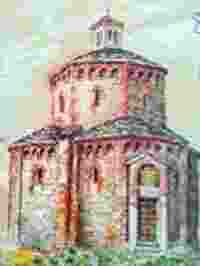Prophet

Sophonia
Saint Sophonia, prophet, in the days of Josiah, king of Judah, foretold the ruin of the wicked in the day of the Lord's wrath and comforted the people of the poor and needy in the hope of salvation "..
Roman Martyrology, 3 December, n. 2.
Join us
Sophonia Prophet
Sophonia, which means "he whom God protects", is the name of the prophet remembered for his mission in the time of the king of Judah, Josiah (640-609 BC).
His preaching is inherent in the idolatrous situation in which the Jewish people find themselves before Josiah's religious reform.
Sophonia insists on the day of the Lord hanging over the history of Judah, over the nations that oppress him and over all mankind. This theme belongs to the prophets who preceded it, in particular to Amos, and to Isaiah. In these prophets the day of the Lord indicates the moment in which God intervenes to severely punish his people or even a pagan people.
Sophonia presents the oracles concerning "the day of the Lord", with a dramatic language that involves all of creation: humanity, heaven and earth. That day will be a time of devastation and anger, of anguish and suffering, of clouds and darkness: "Day of wrath that day, day of distress and affliction, day of ruin and extermination, day of darkness, and a day of cloud and haze, a day of the sound of the horn and the cry of war over the fortified cities and the lofty towers".
(Zep 1: 15-16).
And there is not much time left: "The great day of the Lord is near; it is near and it comes in great haste" (Zep 1:14). Then Sophonia warmly invites us to avoid the idolatry of Baal which was practiced in the city of Jerusalem and which was the cult of the stars imported from Assyria, practiced "on the roofs" of the Temple.
It was essential to sever the bond that the apostates wanted to maintain between Yahve, God of Israel, and Malcam, god of Ammon. Neighboring nations will also be exterminated, and if the Kingdom of Judah wants to escape such destruction, it must repent.
Sophonia while renewing the threats against Jerusalem, announces that those who will escape and live in safety will be the humble, the meek: "I will make a humble and poor people remain among you, who will trust in the name of the Eternal. The rest of Israel. They will not commit iniquity or lie, nor will them be found a deceitful tongue in their mouth; for they will shepherd their flock, they will lie down and no one will frighten them".
"(Zep 3,12-13).
Sophonia, although not comparable to Nahum for the less poetic and less pure style, offers a spiritual picture superior to that of Nahum and Habakkuk: the prophetic vision of Sophonia is universal and of great spiritual value.
